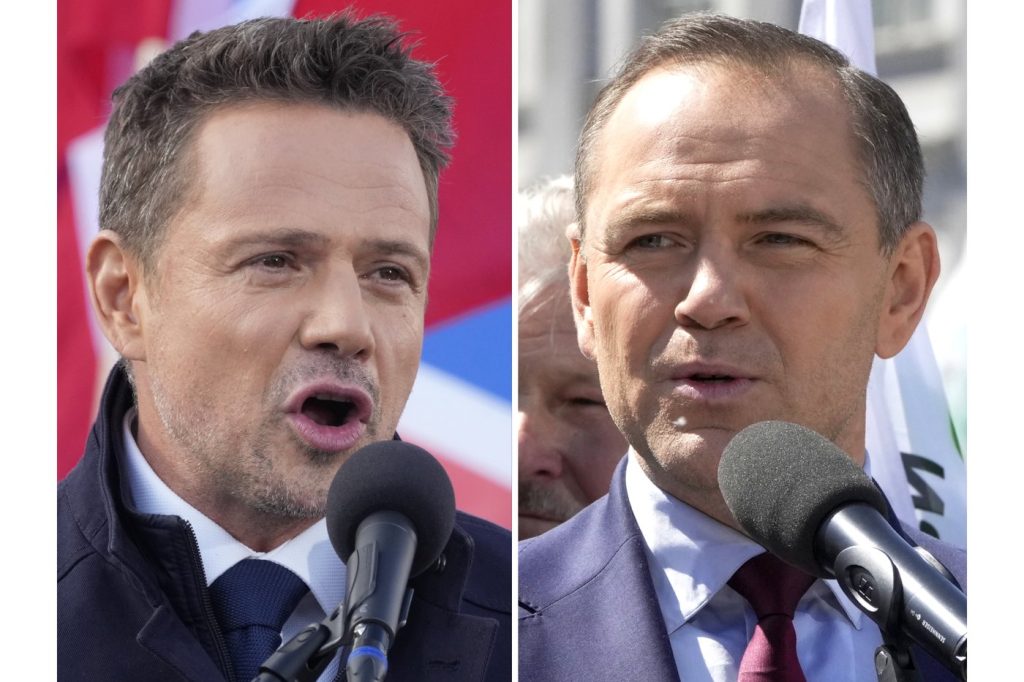WARSAW, Poland (AP) — Poland is preparing for a pivotal presidential runoff election scheduled for Sunday, where two candidates, Rafal Trzaskowski and Karol Nawrocki, present contrasting visions for the nation's future. The winner will take over from President Andrzej Duda, a conservative leader who is completing his second and final term. This election is critical as it will decide whether Poland continues on a nationalist populist trajectory or shifts more towards liberal, pro-European policies.
Polling results from Ipsos will be made public as soon as polls close on Sunday at 9 p.m. local time, with a margin of error of ±2 percentage points. The definitive results are anticipated by Monday. The outcome of this election will significantly influence the agenda of Prime Minister Donald Tusk's centrist government, especially considering the presidential power to veto legislation.
Amid heightened regional tensions due to Russia's ongoing war in neighboring Ukraine, security concerns across Europe, and internal discussions surrounding the rule of law, this election unfolds during a particularly unpredictable time. The first round, held on May 18, saw Trzaskowski, the mayor of Warsaw, achieve over 31% of the vote, while Nawrocki, a conservative historian, followed closely with nearly 30%. The remaining eleven candidates were eliminated during this round.
Current opinion polls indicate a neck-and-neck race between the two candidates. Nawrocki's unexpectedly strong performance in the first round, which exceeded earlier predictions, suggests that he may have garnered more support than anticipated. Furthermore, a significant number of Polish citizens living abroad have registered to vote, which could potentially favor Trzaskowski.
Karol Nawrocki, at 42, is seen as an outsider in politics. He was chosen by the national conservative Law and Justice party despite not having prior political experience or being a party member. His supporters view him as a representation of traditional Polish values, believing that backing from U.S. President Donald Trump will enhance Poland's ties with the United States and reinforce the country's security.
Conversely, Rafal Trzaskowski, aged 53, is a seasoned political figure and the mayor of Warsaw with a strong affiliation to Prime Minister Tusk. As a deputy leader of the pro-European party Civic Platform, Trzaskowski's reputation includes modernizing city infrastructure and expanding public transit. This is his second attempt for the presidency after a narrow defeat to Duda in 2020.
Nawrocki's campaign resonates with themes prevalent in the American right, including skepticism towards EU policies and an emphasis on Christian identity. His position contrasts sharply with Trzaskowski's pro-EU stance, which some fear may jeopardize Polish autonomy. Meanwhile, European centrists favor Trzaskowski, seeing him as a defender of democracy in a climate of rising authoritarianism.
Despite facing multiple scandals recently, Nawrocki's support base appears unshaken, as some right-wing voters are skeptical of the allegations and perceive media coverage as biased. Nawrocki himself has publicly acknowledged involvement in a brawl linked to football hooligans in the past, yet this has not seemingly tarnished his image among his supporters.
The electoral campaign has focused heavily on key issues that are crucial for Polish voters. These include concerns around regional security amid the ongoing conflict in Ukraine, judicial independence, and women's rights. Both candidates express commitment to supporting Ukraine, though their perspectives diverge regarding NATO membership for Ukraine post-conflict. Trzaskowski advocates for restoring judicial independence and mending relations with the EU, while Nawrocki is expected to uphold the changes made by his party that have been critiqued as anti-democratic. In terms of women's rights, Trzaskowski supports relaxing Poland's existing strict abortion laws, while Nawrocki campaigns on preserving traditional conservative values that oppose such liberalization.











